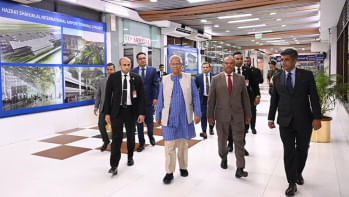PM's Delhi Visit: Muhith hints at $5b fresh Indian credit
India is likely to announce a $5 billion line of credit, most of which will be spent on Bangladesh's railway sector as well as road and waterway projects, during Prime Minister Sheikh Hasina's visit to New Delhi this month.
A portion of the Indian concessional loan will also go to the development of a cancer hospital being built in Dhaka, Finance Minister Abul Maal Abdul Muhith told The Daily Star yesterday in New Delhi where he was to attend the first meeting of finance ministers of seven South Asian countries.
He spoke of possible agreements and proposals to be discussed during PM's five-day visit to India from Friday.
Asked about media reports on the possibility of a defence cooperation deal between the two neighbouring countries, he said India might offer such an agreement but it would be discussed upon Hasina's return to Bangladesh before making a decision.
Meanwhile, India has accepted Bangladesh's proposal to establish road connectivity with the Terai region of Nepal through territories of India and Bhutan. Terai shares border with the eastern Indian state of Bihar. Once the road connectivity with Bhutan using Jalpaiguri of West Bengal is set up, it will reduce the distance between Bangladesh and the Himalayan kingdom to just 30 miles.
Replying to a question, Muhith said Bangladesh had decided to bear 10 percent of the total cost of a proposed 1,000 MW hydro power plant to be set up in Bhutan in collaboration with India.
According to him, the project site will be close to Bhutan's border with India so that electricity can be easily transmitted to Bangladesh without much system loss.
Power consumption in Bangladesh has gone up from 3,000 MW in 2010 to 13,000 MW at present and Bangladesh, being a power-deficit country, is keen on tapping into the enormous hydro power potential of Nepal and Bhutan.
Bangladesh wants to generate 24,000 MW power from its own sources in the next three years, Muhith said, adding that the government is now focusing on improving its electricity transmission system to lower the system loss from 11 percent at present to 7-8 percent.
Earlier, addressing the meeting of South Asia Sub Regional Economic Cooperation (SASEC) countries, Muhith said the challenge for the region was not only to ensure sustainable economic growth but also to make sure that the success was equally shared among member countries.
Despite development efforts in the past, an estimated 800 million people in Bangladesh, Bhutan, India, Maldives, Nepal and Sri Lanka still live in extreme poverty.
SASEC aims at aligning the economic corridors being developed in member countries with cross-border links in order to maximise the developmental impact of investments. Bangladesh, Muhith said, is discussing two major corridors -- Banglabandha-Dhaka-Chittagong-Cox Bazar, and Sylhet-Dhaka-Khulna-West Bengal.
Bangladesh, he said, has the potential to become a transport and transhipment centre for the South Asian Sub Region due to its geographical location, as it borders India and Myanmar and is close to landlocked countries like Bhutan, Nepal and Kunming, the key transportation hub in South West China.
“Further improvement of the multimodal connectivity will lead to enhanced economic cooperation among the countries of this region,” Muhith said.
Chairing the meeting, Indian Finance Minister Arun Jaitley welcomed Myanmar as the seventh full member of SASEC and said that with Myanmar joining the initiative, the grouping will facilitate a “credible link” between South Asia and South East Asia.

 For all latest news, follow The Daily Star's Google News channel.
For all latest news, follow The Daily Star's Google News channel. 








Comments